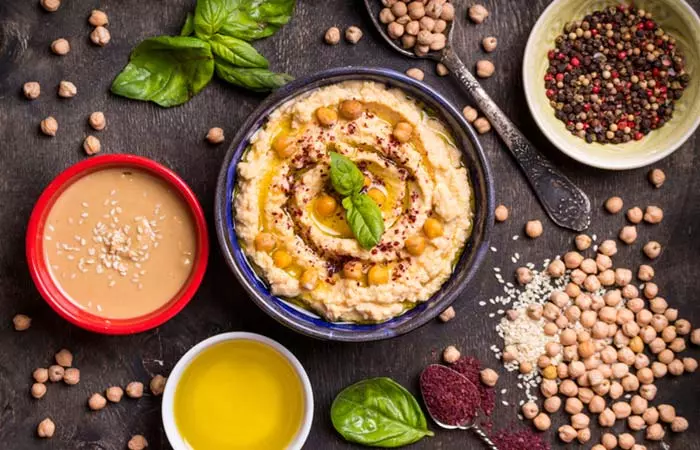Hummus has other benefits as well and may help you lose weight. Discover the health advantages of hummus, nutritional facts, and side effects of hummus in this article. Read on.
What Is Hummus?
Hummus is a popular spread, dip, or savory dish. It is made with chickpeas, tahini (sesame seed paste), extra virgin olive oil, lemon, and garlic. The nutty and creamy dish is easy to prepare and is loaded with vitamins and minerals. It is available in both traditional and non-traditional varieties and is served as an appetizer or a snack too. Hummus is rich in fiber and other nutrients. Here’s everything you need to know about its nutritional profile.
Nutrition Facts Of Hummus
According to the U.S. Department of Agriculture, one tablespoon (15g) of hummus contains (1):
Calories: 35.6 Protein: 1.17g Fat: 2.67g Carbohydrate: 2.25g Fiber: 0.825g Sugars: 0.093g Calcium: 7.05 mg Iron: 0.381 mg Potassium: 46.8 mg Sodium: 63.9 mg Zinc: 0.216 mg Copper: 0.057 mg Magnesium: 11.2 mg Phosphorus: 27.2 mg Thiamin: 0.024 mg Folate: 7.2 µg
This long list of essential nutrients in hummus helps promote health and improve diet quality (2). Keep scrolling to know the health benefits of hummus.
Health Benefits Of Hummus
1. May Have Anti-Inflammatory Properties
A diet rich in non-soy legumes was found to reduce inflammation (3). Traditional hummus is a nutrient-dense dip or spread with extra virgin olive oil as the main ingredient (4). A study by Deakin University, Australia, found that phenolic compounds like oleocanthal in virgin olive oil have anti-inflammatory effects (5). These compounds reduce inflammatory conditions like inflammatory bowel disease, rheumatoid arthritis, psoriasis, and multiple sclerosis (6). However, more research is needed in this regard. Tahini, another important ingredient in hummus, may also help treat inflammatory diseases (7). The tahini benefits extend beyond just adding flavor, it can further support the fight against inflammation.
2. May Help Control Blood Sugar Levels
Chickpeas in hummus have a low glycemic index (meaning, they digest slowly and help keep blood sugar levels in control) (8). The fiber content in hummus also slows down the digestion of food (9). A review published in the Journal of Food Science and Technology suggests that chickpeas may reduce blood glucose concentration by 29% to 36% (10). This is one of the many chickpeas benefits, but more studies are needed to understand this benefit of hummus in humans.
3. May Improve Digestive Health
Hummus, which predominantly contains chickpeas, may have the potential to improve gut health thanks to its high fiber content. A study by the University of Kentucky, USA, found that a higher intake of dietary fiber may reduce constipation, hemorrhoids, and gastroesophageal reflux disease (a digestive disease) (11). According to the U.S. Department of Agriculture,100 grams of hummus contains 5.5g of dietary fiber (1). The raffinose content in chickpeas may also promote intestinal health (12). However, more studies are warranted to prove this claim.
4. May Reduce Cardiovascular Disease Risk
A diet rich in non-soy legumes may decrease LDL cholesterol levels (13). Besides, the extra virgin olive oil in hummus may reduce the risk of cardiovascular disease (14). The fiber-rich chickpeas, olive oil, and sesame seeds are rich in monounsaturated fatty acids that are beneficial for the heart (15). A study by the University of Tasmania, Australia, found that including chickpea in diet may lower serum total and LDL cholesterol levels in adult men and women (16).
5. May Promote Weight Loss
Research suggests that diets with a low glycemic index are beneficial in treating obesity (17). Also, the intake of hummus has been associated with lower obesity risk (18). Taking chickpeas regularly may also lower body mass index (BMI) and waist circumference (18). Additionally, a study comparing healthy snack options showed that snacking on hummus can be a positive step towards appetite control for those looking to lose weight (19). It was found to reduce the appetite by 70% when compared to building a habit of no snacking. Compared to hummus, a few other healthy food options such as snacking on granola bars were shown to not lower appetite indices at all. Hummus also has a 30% improved satiety compared to no snacking. Further, chickpeas may also boost protein for building lean mass and maintaining good muscle mass, making it a great food option for those looking to lose weight or just stay fit. However, limited studies are available on the direct weight loss benefit of hummus. A study on the consumption of chickpeas and hummus analyzed the dietary patterns of 37,552 individuals in the US from the National Health and Nutrition Examination Survey. Adults who consumed chickpeas were 48% less likely to have metabolic syndrome, while those who consumed hummus were 62% less likely to have the same. It is evident that consuming hummus can have many benefits. Here is how you can prepare hummus in your kitchen.
Hummus Recipe
What you Need
Cooked chickpeas – 1 ½ cups (250g) Well-stirred tahini – ¼ cup (60 ml) Fresh lemon juice – ¼ cup (60 ml) Extra-virgin olive oil – 2 tablespoons (30 ml) Minced garlic clove – 1 Ground cumin – ½ teaspoon Water or aquafaba – 2 to 3 tablespoons Salt – to taste Dash ground paprika or sumac – for serving
Process Lynn, a blogger, has tried hummus and shared her experience in a blog post. She says “I used canned chickpeas instead of soaking dried chickpeas overnight and then cooking them the next day. It is quite possible that would have been less work than peeling the skins off of the canned chickpeas. But it isn’t just the preparation of the chickpeas responsible for creating such a deeply flavorful, immensely addictive. The outrageous amount of tahini (one cup plus two tablespoons) is one of the genius aspects of this hummus (i).’ Hummus tastes very delicious, and it goes well with some vegetables. Scroll down to find what they are.
What Goes Well With Hummus?
Radishes Avocado Spaghetti squash Leafy greens Cauliflower Bell peppers Sweet potatoes Carrots Zucchini Brussels sprouts
Consuming hummus is considered safe for many people. It is gluten- and dairy-free. It is suitable for people with lactose intolerance, celiac disease (immune reaction to eating gluten), and other allergies related to nuts. But are there any risks associated with it? Scroll down to know in detail.
Risks Associated With Eating Hummus
People with irritable bowel syndrome (IBS) should avoid eating hummus. This is due to the presence of chickpeas that contains high raffinose (FODMAP) (20). Consuming hummus in excess may also increase the risk of high blood pressure due to its high sodium content (21). Its main ingredient, tahini (made from sesame seeds), is a common allergen (22). Always avoid hummus with preservatives.
Explore the health benefits of the popular Middle Eastern dish, hummus, in this video. Learn about its positive impact on your well-being, and how it can be a delicious and nutritious addition to your diet. Is it OK to eat hummus every day? Yes, it is okay to eat hummus every day in moderation with a diverse range of other foods. Does hummus make you poop? Hummus can help regulate bowel movements. It has dietary fibers that help prevent constipation (11). Is hummus better for you than peanut butter? Hummus is slightly healthier than peanut butter in terms of fat content (1), (23). How much hummus can I eat a day? You may eat up to 2 tablespoons of hummus a day. Also, drink lots of water after that. Does hummus cause gas and bloating? Yes, hummus may cause gas and bloat.








